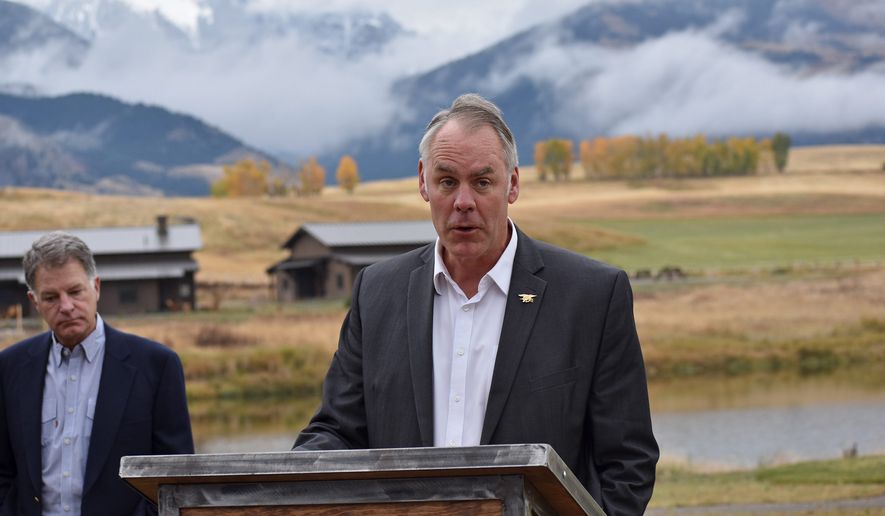Top Trump administration officials now say they’re prepared to enlist the U.S. military in a new mission to help move American coal and natural gas to key markets in Asia, an end-run around political and environmental roadblocks in the West that critics denounced as “harebrained” and a “Putin-like move.”
Interior Secretary Ryan Zinke on Monday told the Associated Press he wants to use military bases in Alaska and other Pacific states as hubs for exporting U.S. fuel, which is in high demand abroad but remains constrained by West Coast Democratic governors who have blocked new export terminals on environmental grounds. The proposal — the details of which remain murky — would mark a radical change for U.S. energy policy and could see military facilities for the first time used directly to ship fuel overseas.
“I respect the state of Washington and Oregon and California,” Mr. Zinke said. But “it’s in our interest for national security and our allies to make sure that they have access to affordable energy commodities.”
He added that increasing exports may require using “some of our naval facilities, some of our federal facilities on the West Coast.” Mr. Zinke mentioned only the abandoned Adak Naval Air Facility in Alaska as a potential location, though he suggested other military bases and federal properties also could be tapped.
The coal industry immediately welcomed the move, pointing to the fact that exports are up 30 percent this year over last as the Trump administration has taken a more aggressive approach in exporting U.S. energy and has relaxed a host of environmental regulations put in place by former President Obama.
“While we haven’t seen any specifics around this proposal, any move to support the export of U.S. coal to our allies would be welcome,” said Ashley Burke, spokesperson for the National Mining Association.
Natural gas also has seen a huge uptick in exports. So far this year, net natural gas exports have averaged 0.87 billion cubic feet per day — more than the double the daily average in 2017, according to figures from the federal Energy Information Administration.
Energy industry leaders believe there’s even greater opportunity in Asia and elsewhere, but getting more product to market will require additional export facilities.
Getting such facilities up and running has proven an uphill battle for the administration, energy-producing states and the companies producing the fuel. Washington state, for example, late last year denied a proposal to a build a new port that would ship coal to Asia.
The state now finds itself embroiled in a legal battle with six other states that say Olympia is wrongly exercising control over federal ports.
In a statement Monday, Washington Gov. Jay Inslee, a Democrat, blasted Mr. Zinke’s proposal and said he’s heard nothing from the White House about the proposal.
“This reckless, harebrained proposal undermines national security instead of increasing it, and it undermines states’ rights to enforce necessary health, safety and environmental protections in their communities. The men and women who serve at our military bases are there to keep our country safe, not to service an export facility for private fossil fuel companies,” he said. “Our state has been left in the dark about the administration’s latest scheme.”
Environmental groups were equally harsh, calling the proposal an un-American use of government resources for the gain of private energy companies.
“In this country — unlike Russia — the military isn’t supposed to be used to serve powerful financial interests. This is a Putin-like decision,” said Eric Schaeffer, executive director of the Environmental Integrity Project and a former EPA official. “Zinke’s living in the wrong country for that to work here. I’d expect Congress to block it.”
Pentagon officials did not respond to a request for comment on whether the Defense Department has been consulted about the move.
On Capitol Hill, a handful of Republican lawmakers already have come out in favor of the idea.
There “might be, for example, retired military facilities or other places where we would be able to use those for exports — frankly, to get around some of the unreasonable obstacles that have been thrown up,” said Rep. Liz Cheney, Wyoming Republican.
• Ben Wolfgang can be reached at bwolfgang@washingtontimes.com.




Please read our comment policy before commenting.